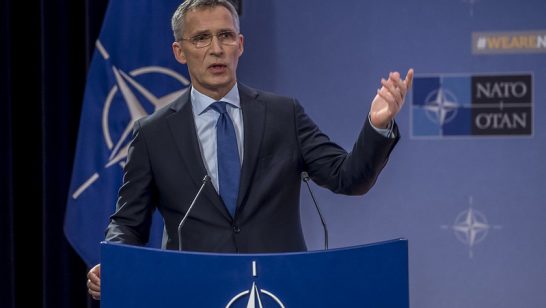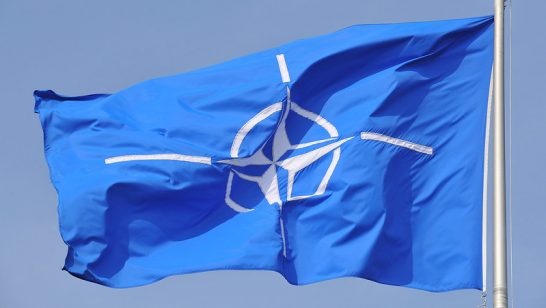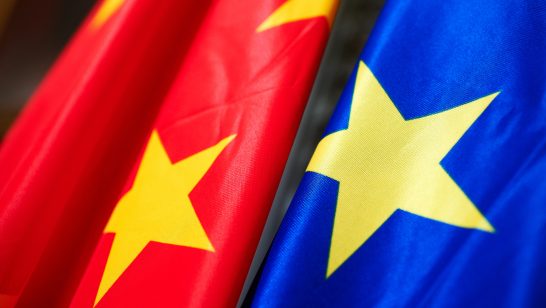
The China debate is in full swing. In June, NATO Secretary-General Stoltenberg joined the international chorus line calling for NATO to stand up against “China’s bullying and coercion“, echoing remarks, almost word for word, made by U.S. Secretary of State Mike Pompeo earlier that month.
There are many valid reasons to be alerted to China’s increasing assertiveness, but the key political question “what now?” remains unanswered. Regrettably, the NATO chief failed to offer any concrete ideas on how the 30-member Alliance can approach China in the future.
In the past ten years or more, NATO has had ample time to come to grips with a more self-confident and nationalist China. But there always seemed to be more pressing issues on the Alliance’s agenda. Responding to Russia’s illegal annexation of Crimea and parts of eastern Ukraine was a case in point. Even so, for quite some time, NATO looked strategically asleep when it came to China’s growing strategic ambitions: Neither individual allies nor Stoltenberg felt a particular need to make China a topic for NATO’s strategic consideration. Today though the subject has all the ingredients for a polarizing debate and the Alliance needs a smart strategic response towards China – now.
The obvious advantage of a dedicated transatlantic China strategy would be a common Western response to the country rather than – as is currently the case – individual NATO members positioning themselves vis-à-vis China. This is no easy task given the web of bilateral economic treaties and strategic partnership agreements that China has agreed with a large number of European states over the past two decades. The argument that the Chinese Communist leadership has deliberately sought to split Europe with its various trade and investment agreements may be correct. Still, more than anything, Beijing’s divisive tactics should be a political incentive for all NATO allies to agree on a joint approach.
A coherent strategic response to China’s complex power projection on NATO member states and their vicinity can only be through a dual approach of defence and deterrence on the one hand and dialogue and cooperation on the other. There is no evidence that China is seeking a direct military confrontation with any NATO member or threatening the Alliance with its conventional and nuclear weapons. Unlike Russia, China does not intend to use military force to change the territorial boundaries in Europe.
But the Alliance would have to underscore that it is prepared to defend the security of its members and their collective interests against Chinese cyber-attacks, disinformation campaigns, and espionage activities. It is not just China’s growing political and economic influence in NATO’s close vicinity that should be a cause for concern, providing Beijing with an effective instrument for influencing national decision-making in these countries. In the medium and long term, the question of to what extent China will also use the deep-sea ports, tunnels, bridges, roads, and other critical infrastructure is also relevant. This is all the more important because defending Chinese economic interests overseas, notably the Belt and Road projects, is one of the country’s explicit national security goals.
Additionally, China has been preparing its armed forces for expeditionary operations for some time now. In particular, it continues with the modernization of the country’s naval capabilities. Against this background, NATO should have a fresh look at its maritime strategy that dates back from 2011 and should upgrade its efforts to protect critical infrastructure. The allies would have to formalize their expectation that the Chinese government adheres to international norms and rules, in particular the U.N. Convention on the Law of the Sea, and is prepared to strengthen international arms control and non-proliferation agreements. NATO should also appeal to Beijing to establish a minimum level of transparency regarding its nuclear and conventional posture, its military objectives and activities, as well as its defence budget.
Given Beijing’s concern that NATO might establish a military stronghold in its neighbourhood, or would seek to interfere in regional security issues in the Asia-Pacific region, the allies should stress that this is not its intention (even though the U.S. and Canada are two Pacific nations with legitimate interests in the region). The Alliance also attaches great importance to its partnerships with Australia, New Zealand, Japan, and South Korea with which it has been working closely on a number of security issues. There are no reasons why the Alliance should stop doing so. By contrast, NATO’s relations with India – which plays a key strategic role in the region – can certainly be upgraded. Another key message should therefore be that the Alliance will maintain its partnerships in the Asia-Pacific region and expand them in the future as necessary. China must live with such a NATO role in the region.
Reflecting the second pillar of a dedicated China strategy, the Alliance should offer a structured dialogue and some practical cooperation. There would be no shortage of appropriate, carefully selected issues that are in NATO’s collective interest. For the NATO allies, it would be highly relevant to hear China’s viewpoints on nuclear deterrence and disarmament issues, the situation in North Korea, the possible development of cyber-norms, and maritime security. NATO’s position on Afghanistan, energy security, and counterterrorism could be of interest to the Chinese side. Both parties could agree on a set of military confidence-building measures on issues of military reform, doctrines, and exercises in order to gradually establish transparency in sensitive areas. The allies may also want to consider whether and how they want to involve China in maritime operations at some point, ultimately to take the Communist leadership at its word when it presents itself as a global actor. Realistic expectation management would thus be an important prerequisite for the success of such an undertaking.
China would not be an easy partner for NATO. For the foreseeable future, it will remain an authoritarian-ruled country whose leaders reject Western ideas of democracy and human rights, systematically control their population, and lock their Muslim minorities into concentration camps. A NATO-China partnership will not change all this. But, as the Alliance’s track record of dealing with authoritarian partners shows, a NATO-China Council could help deescalate this fractured relationship. Hoping for a more conciliatory U.S. President in the White House early next year is not an effective strategy. China’s long-term strategic aspirations require a transatlantic response now.
The opinions articulated above represent the views of the author(s) and do not necessarily reflect the position of the European Leadership Network or any of its members. The ELN’s aim is to encourage debates that will help develop Europe’s capacity to address the pressing foreign, defence, and security policy challenges of our time.
Image: Wikimedia commons



